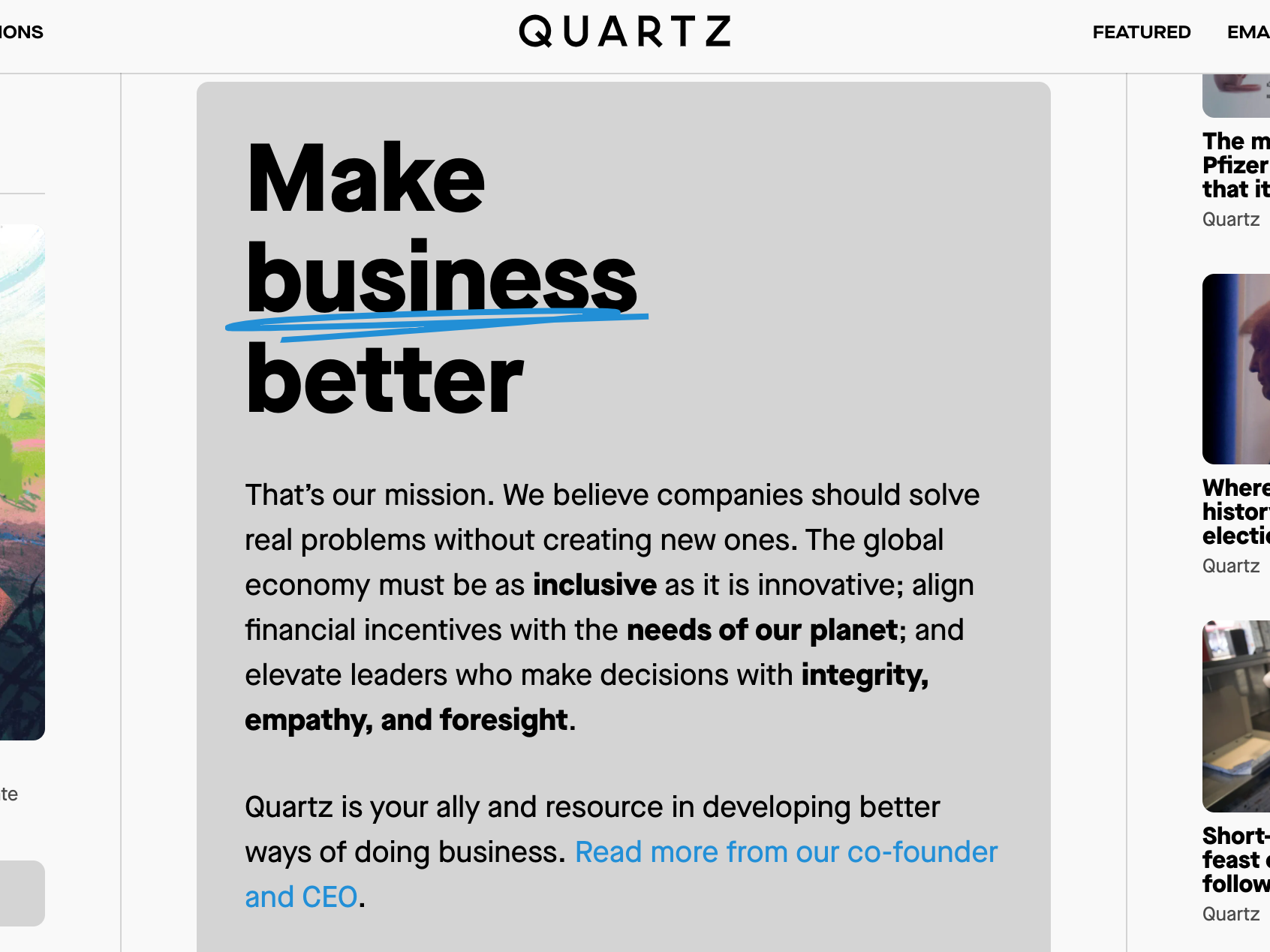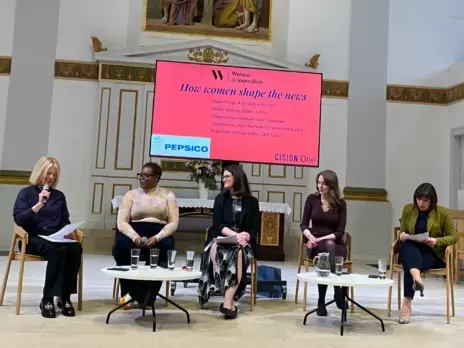
In the first half of the past decade, business news website Quartz was one of a handful of young media companies being held up as evidence of a bright future for digital journalism.
Alongside the likes of Buzzfeed and Vice, Quartz was making large editorial investments, taking a long-term approach rather than chasing short-term profits.
By 2016, Buzzfeed was valued at $1.7bn following investments from NBCUniversal. Vice was valued at $5.7bn not long afterwards.
Quartz, a more modest proposition than its general interest news peers, reported revenues of $30m in 2016 and a $1m profit. Its founding parent company, Atlantic Media, was rewarded for its investment in 2018 when Japanese media giant Uzabase agreed a deal, ultimately worth around $86m, to buy Quartz.
Fast-forward to 2020, and all three of these young media companies – and their investors – have been harshly brought down to earth.
Buzzfeed expects to make a profit this year, but only after making significant cutbacks in 2019 and again amid the Covid-19 crisis. In May, Vice laid off 155 staff – said to be equal to about 5% of its global headcount.
Around the same time as the Buzzfeed and Vice cuts were announced, Quartz was forced to axe 80 jobs – equal to 40% of its global workforce – and close offices in London, San Francisco, Hong Kong and Washington.
In October, the Wall Street Journal reported that Uzabase had decided to cut its losses and sell the business, which had seen its revenues fall 22% to $27m in 2019 and was suffering further amid the Covid-19 advertising slowdown.
Just over a month on, and Uzabase this week announced the sale of Quartz – to its own chief executive, Zach Seward, who led a management buyout that also included editor-in-chief Katherine Bell. The terms of the sale have not been disclosed, but Uzabase has said a loss of around $55m will appear next to Quartz on its balance sheet this year.
Why Uzabase gave up on Quartz
The fact that Uzabase chose to offload Quartz so soon after it bought the business appears to represent a setback for the publication and a disappointment for those encouraged by its early successes.
But Seward, who is now the company’s largest shareholder, says he is confident in its future. It is also worth noting that Uzabase’s chief executive, Yusuke Umeda, has agreed to make a personal loan to Quartz, suggesting he retains belief in its prospects.
“Obviously Uzabase didn’t intend, when they bought Quartz two years ago, to be separating [from] the business so quickly,” says Seward, a former Wall Street Journal reporter and social media editor who co-founded Quartz in 2012.
“They ultimately concluded that the company needed to focus on its original businesses based in Japan. Having made that decision, they independently explored a whole variety of options.
“And in the middle of that process, I raised my hand, had a conversation with Yusuke the CEO of Uzabase, to tell him I was interested in exploring a management buyout, and to gauge whether he and Uzabase would be interested in considering that option as well.
“Obviously they were interested in doing that, and we continued to have that conversation and negotiations. I assume they also assessed other options but that part was on their end.”
In a company statement explaining why it chose to offload Quartz, Uzabase pointed to the collapse of the US advertising market brought on by the Covid-19 crisis. The company said it could not make Quartz profitable within three years of its investment, despite previous commitments that it would do so.
This situation underlines the challenges young media companies can face when they are taken over by larger entities, especially those that are publicly listed and are required to provide regular financial updates to investors.
When will Quartz be profitable? ‘Just ASAP,’ says Zach Seward
This is not to say that Seward – who is seeking new investors to back the newly independent Quartz – is not aiming to quickly improve the company’s financial situation. Asked when he wants Quartz to return to profitability, Seward says: “Just ASAP.”
He adds: “The sustainability of the business – which is, I suppose, a fancy way of saying our profitability – is as critical now as it was then. And a big focus – the most important focus for us on the business side – of the company is to achieve as strong a performance as we can, get us to break even. That was true before, and is true now. We’re in control of our destiny in an important new way, and that includes making those choices between short and long-term priorities.
“I want, and have always wanted, to build a long-term sustainable business. You get to that long-term proposition by really, really strong performance in the short-term, so that remains our focus.”
Subscription growth and advertising recovery
Seward does not deny that 2020 has been tough for Quartz. But there remain some reasons for optimism.
Like many other media groups, Quartz has experienced strong growth in its subscription business this year. The company said in September that it had reached 21,000 paying members, up from 11,000 in November 2019.
Seward declines to provide a more up-to-date figure, but says the number has grown further. He adds that on Monday this week, after announcing his buyout of Quartz to readers and asking for their support, the website experienced its biggest daily jump in new numbers since the launch of its membership scheme in 2018. Quartz is understood to be on track to make $1.9m in subscription revenue this year.
Seward says Quartz’s advertising business is also improving. “We have seen recovery in the ad business since the worst of it when the pandemic struck in the United States and parts of Europe and had its most acute effects on the economies there,” he says. “It had a really immediate and dramatic effect on our ad business, as it did to some of the other publishers. It’s been a relief and confidence-building to see it recover from there along with the rest of the economy.”
‘It ought to be an emboldening moment for Quartz’
Quartz, like many other digital media companies in the US, is focusing much time and effort on improving the subscriptions side of its business. But Seward indicates that advertising remains just as important.
“Advertising is and will remain just as important to our revenue mix and business performance,” he says. “I’m a big believer, as many people in digital media are these days, that a healthy mix of revenue streams is the only way to build a strong media company.
“For us today, the main revenue streams are the subscription business and the advertising business. We have plans to expand revenue streams from there while continuing to grow both subscription and advertising. Over the long term, I would expect those businesses to be in parity.”
As Quartz sets out on the next stage of its company journey, Seward says its staff – numbering 110 after this year’s cutbacks, including 50 journalists based across the US, UK, India and Hong Kong – are feeling “very positive”.
While the company has lost the stability of being owned by a large company, Seward is hopeful the newly independent Quartz can rediscover some of the traits that helped it grow rapidly in its first six years.
“Most of Quartz’s strongest values as a company – boldness, creativity, putting users first, even the spirit of generosity – were a direct consequence of being an independent startup,” he says.
“I thoroughly believe our best work is done under those conditions, where everyone feels permission to take risks, take leaps, with their work – to pour energy and creativity into their writing, the products they’re building.”
He adds: “It is a very different thing entirely to be on our own and independent. It ought to be an emboldening moment for Quartz in that respect.”
‘I’m worried that you’ve got just a few that might survive’
After a tough 2020, what next for Quartz and its young digital peers?
Emily Bell, the founding director of the Tow Center for Digital Journalism at Columbia Journalism School, is fearful for the future of many online journalism startups following the coronavirus crisis.
“You had this great, thriving scene of innovation in 2010, 11, 12… Quartz, Vice, et cetera,” she says. “But they all innovated on the basis that advertising would continue to be the dominant business model. And so when that failed, you saw how weak a lot of new institutions were.”
Bell adds: “If you were being harsh you would say we had this glut of new startups, and there probably just wasn’t the market to sustain them anyway, and perhaps a billowing out was inevitable.
“I think unfortunately it’s gone beyond that with the recession and [collapse] of advertising as a model for these outlets. So now I’m worried that you’ve got just a few that might survive.”
Read our analysis of audience data for digital native news publishers in the UK over the last four years
Email pged@pressgazette.co.uk to point out mistakes, provide story tips or send in a letter for publication on our "Letters Page" blog






